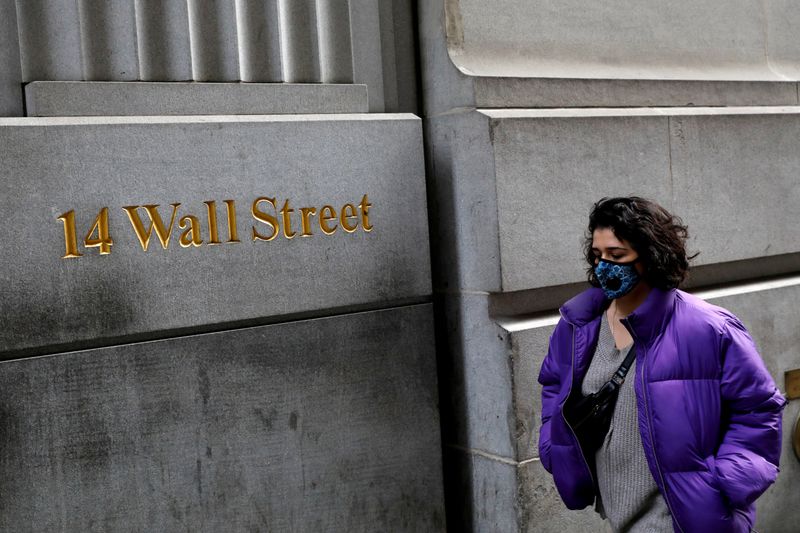This post was originally published on this site
https://i-invdn-com.akamaized.net/news/LYNXMPEA7Q0M3_M.jpg
HONG KONG/PARIS/LONDON (Reuters) – Face masks, temperature checks and packaged sandwiches could all become part of the daily routine for bankers as their employers work out how to get them safely back into the office.
While a growing number of countries are starting to ease lockdowns to contain the coronavirus pandemic, the threat of a new wave of infections remains high.
That means banks are having to look at new ways of organising buildings that before the crisis would have had packed elevators, crowded cafeterias and desks less than two metres apart. Given the risks, many staff will still have to work from home.
“We’re going to do it in a way where employees feel comfortable coming back in,” said Mark Fedorcik, head of Deutsche Bank ‘s (DE:DBKGn) investment bank, where around 84% of staff are currently working from home.
Financial centres in Asia will be the first to see a significant return of staff to the office.
Goldman Sachs (N:GS) had about 25% of its Hong Kong employees back in the office this week and has a target of 35% by May 11 and 50% by May 25, according to a source with direct knowledge of the plans. Like other major office buildings in the city, temperature checks will remain at the entrances.
At UBS (S:UBSG), the key pad entrances to its three Hong Kong offices have been removed to avoid having people constantly touch them, and access will now be through swipe card systems.
In most of its divisions, the bank is preparing to put staff in teams that will alternate between working at home and coming into the office, where it will be mandatory to wear face masks.
In France, where the lockdown is due to start being gradually lifted from May 11, the country’s third-biggest bank Societe Generale (PA:SOGN) has begun to discuss with unions how to protect staff when some of them return to the office.
One union, CGT, has asked for suggestions on its website. Proposals include asking the bank to provide tongs for picking up coffee pods, to buy scooters for staff, or to subside the cost of travelling to work in a way that avoids public transport.
Societe General declined to comment on the proposals.
A source at an American bank in Paris said it was preparing to carry out regular disinfections and to rearrange desks to make sure staff sit the recommended two metres apart.
PAPER PLATES
In Germany, Deutsche Bank is in no rush to get staff back in the office, with strict limitations on gatherings still in place across the country, a person with knowledge of the matter said.
The cafe at the bank’s twin-tower headquarters in central Frankfurt is expected to continue to operate under reduced hours, with dining in and self service both banned.
Kitchen staff give employees food on paper plates to be eaten at their desk or elsewhere. And many of the bank’s coffee machines are out of commission to promote hygiene.
In the United States, JPMorgan (N:JPM) told employees last week it was working on a plan to return staff to offices in phases, though it has no official timeline for the process.
Discussions include possibly assigning building staff to press buttons on elevator key pads, and scrapping the buffet service in cafeterias in favour of selling packaged foods.
Wells Fargo (N:WFC) has cautioned employees that working conditions may not return to normal even as government officials loosen coronavirus-related restrictions, according to an April 22 memo viewed by Reuters.
“Instead, we will continue with the safety measures we have put in place at our work locations and we will expect the more than 180,000 employees who are working from home to continue to do so,” the memo, signed by Chief Operating Officer Scott Powell, said.
The bank has also launched an on-site nursing service at 56 of its largest U.S. sites to screen for coronavirus symptoms, such as a high temperature.
As banks develop their plans, employee wellbeing is not the only criteria. With many leasing real estate in some of the world’s most expensive financial districts, the potential for longer-term cost cuts will also be in play.
“I think every company, including Deutsche Bank, will assess whether you need everyone working in the office or if there are ways to have some people work from home that haven’t been doing so historically,” said Fedorcik.
On Wednesday, Barclays (L:BARC) chief executive Jes Staley said the British bank would not revert fully to its pre-January working habits. Staff, including investment bankers, could work from branches as well as other locations rather than all being packed into their central offices, he said.
“There will be a long-term adjustment in how we think about our location strategy … the notion of putting 7,000 people in a building may be a thing of the past,” he said.

